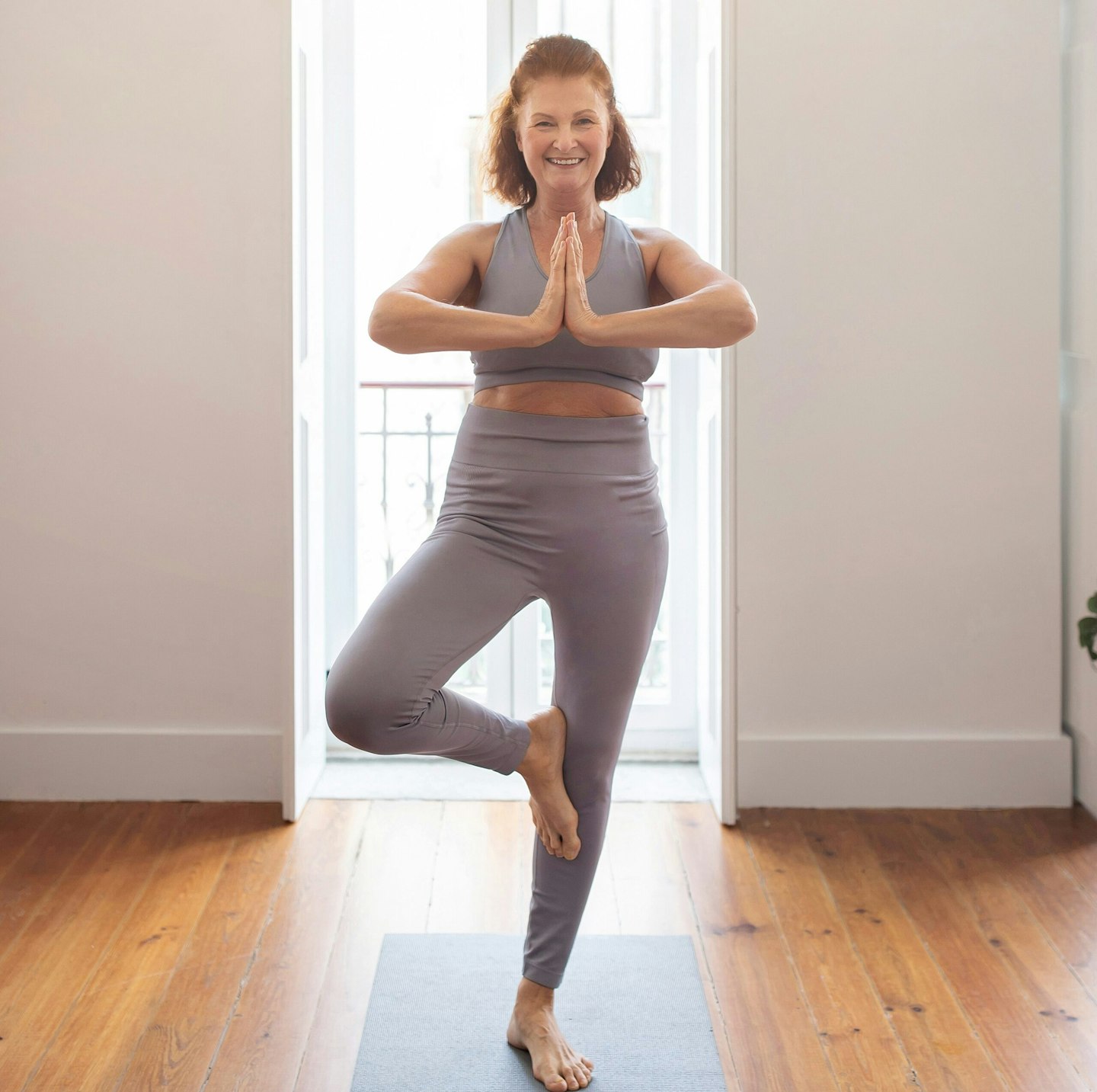GP Dr Sarah Cooke and Physiotherapist Christine Simms share their top tips that could help extend your life by a whole decade.
While you may look to your parents to determine how long you might live, studies have shown that genetics only account for 20-30 per cent of longevity. That means environmental influences like our diet and lifestyle can have a huge impact – and, crucially, they can add healthy years to your life. The good news is, these are things that are in our control and changing them might be simpler than you think!
Here we speak to two trusted health experts who share their simple secrets that could help you live a whole decade longer and healthier.
1. Balance on one leg
It might seem odd, but being able to balance on one leg is an important marker of longevity. Physiotherapist Christine Simms says: “Good balance is important as falls can have major consequences for older people, usually because you might break a bone and need surgery, and some never regain the same mobility afterwards.”

A study conducted by the British Journal of Sports Medicine found that those who can stand on one leg for 10 seconds or longer have better longevity than those who can’t. Christine recommends the ‘flamingo’ pose. “Look straight ahead with your arms by your side and tuck one foot behind the other calf. If you find this easy, add some challenges: close your eyes or move the suspended foot or ankle a bit. You can incorporate this into daily activities such as standing on one leg while waiting for the kettle to boil or the toaster to pop!”
2. Make movement part of your day
Studies have found that those who live the longest often build exercise into their day-to-day lives, rather than go to the gym or do a formal class. Danish research also showed that those who cycled daily lived four years longer than those who did minimal exercise.
Christine Simms says: “Take some time to think about what this might look like for you. Maybe it’s gardening, taking the stairs whenever possible or parking further away so you have to walk a bit more. Remember, it’s important that the exercises and changes are achievable.”
3. See your GP
Registered Associate Nutritionist and GP, Dr Sarah Cooke says if you notice any new symptoms, seeing a GP as soon as possible is important. “If you’re experiencing new symptoms that last – as a rule of thumb – for three weeks or more, such as a cough, a change in bowel habit, or weight loss without trying, then it’s important to speak to your GP.” No new symptoms? You can still go for a health check. “The NHS offers these every five years if you’re aged 40-74, and they include checking for diabetes, high cholesterol and your blood pressure. It’s a good idea to attend these so you can modify your lifestyle to deal with any health issues and prevent conditions which may occur.”

4. Find healthy ways to cope with stress
A recent study by Yale University found that being under chronic stress can shorten your lifespan. Another found that stress can reduce a woman’s lifespan by 2.3 years. Dr Sarah Cooke is also keen to point out that stress can also lead to unhealthy coping mechanisms, which can result in health complications.
“Stress is an inevitable part of life and, while we can’t remove all stressors, there are ways to improve our response. Adopt healthy coping mechanisms like exercise, connection with loved ones, hobbies such as reading and listening to music, rather than unhealthy ones like alcohol and comfort eating.”
5. Fill up on plants
When scientists have studied areas of the world where people live the longest – including regions in Italy, Greece and Japan – they have one thing in common: the people eat a diet rich in plant-based foods. Nutritionist Dr Sarah Cooke says: “Eat a colourful diet, full of a variety of fruits, vegetables, nuts and seeds, wholegrains, beans and whole foods. Think about adding colour to your plate rather than cutting out foods.” A focus on heart-healthy foods will also help you live a longer and healthier life.
6. Get your shut-eye
An American College of Cardiology study found that men who regularly sleep well could live almost five years longer and women, two years longer than those who don’t. They will also generally find they have better health during their lives.
Dr Sarah Cooke says: “Sleep restores us and gives the body a chance to repair. Sleep disruption – particularly in shift workers – is associated with an increased risk of type 2 diabetes. Plus, a good night’s sleep makes other healthy habits easier.”
Making sure you get up and go to bed at similar times every day can help aid sleep, along with going for a walk in daylight and taking a warm bath or shower before going to bed.

7. Trim your tum
Carrying fat around your abdomen means you likely have visceral fat (fat around your organs), which is associated with health risks and a higher mortality risk. It can increase your risk of developing diabetes and heart disease, which in turn have a negative effect on lifespan.
Sticking to a diet high in plant foods, reducing processed foods, losing weight and staying active can help reduce visceral fat.
8. Look after your grandchildren
A study showed that grandparents who spend time with their grandchildren tend to live longer; in fact they have a 37 per cent lower mortality risk compared to ones who give no care.
Christine Simms says, “Caring responsibilities give us a sense of purpose and building close bonds stimulates the release of oxytocin, which helps reduce stress and increases feelings of safety, which will contribute to longevity. In addition, the joy of playing with grandchildren encourages you to join in playfully and you’ll be more active, improving joint mobility.
“Care-giving might also involve helping out in your neighbourhood, voluntary work or looking after a pet.”
9. Form a community
Being around people is good for our health. Research shows that people with strong social connections tend to live longer than those who are more isolated. Christine says we release oxytocin when we bond and connect with others.
“Oxytocin is also known as a ‘cardio protective hormone’ because it triggers the release of nitric oxide which dilates the blood vessels causing blood pressure to reduce. So, kindness is good for the heart and reducing stress. Aim to include yourself in social connections with people who show kindness. Developing relationships with these sorts of people will reduce stress and make you feel happier.”
10. Drink alcohol in moderation
Some studies have shown moderate alcohol consumption can reduce your chance of heart disease, with red wine thought to be the best choice due to antioxidants. Dr Sarah Cooke says moderation is key. “Generally consuming alcohol within a healthy limit: 14 units or less per week, with at least three alcohol-free days, is advised. Higher consumption of alcohol is associated with certain cancers, liver disease, heart attacks, strokes and poor mental health.” And if you’re a smoker? “Smoking should be avoided, it’s never too late to quit and see the health benefits!”
Meet the experts
Dr Sarah Cooke is a GP and Registered Associate Nutritionist. She is passionate about how diet and lifestyle can optimise health and prevent disease, and she shares her knowledge through her website drscnutrition.com.
Christine Simms is a physiotherapist, Pilates teacher and psychotherapist. She is the founder of The Mind-Body Guide, helping people recover from chronic pain using a mind-body approach through her site, themindandbodyguide.co.uk.
Annabelle Lee is a Lifestyle Editor at Bauer Media. She specialises in health, wellness and lifestyle celebrity content.
